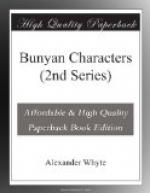Fleming, some things I have had thereanent that seem
so strange and marvellous that I forbear to set them
down. And in Halyburton’s priceless Memoirs
we read: “Hereby I was brought into a doubt
about the truths of religion, the being of God, and
things eternal. Whenever I was in dangers or
straits and would build upon these things, a suspicion
secretly haunted me, what if the things are not?
This perplexity was somewhat eased while one day
I was reading how Robert Bruce was shaken about the
being of God, and how at length he came to the fullest
satisfaction.” And in another place:
“Some days ago reading Ex. ix. and x., and finding
this, ’That ye may know that I am God’
frequently repeated, and elsewhere in passages innumerable,
as the end of God’s manifesting Himself in His
word and works; I observe from it that atheism is
deeply rooted even in the Lord’s people, seeing
they need to be taught this so much. The great
difficulty that the whole of revelation has to grapple
with is atheism; its whole struggle is to recover
man to his first impressions of a God. This one
point comprehends the whole of man’s recovery,
just as atheism is the whole of man’s apostasy.”
And, again, in another part of the same great book,
Halyburton says: “I must observe, also,
the wise providence of God, that the greatest difficulties
that lie against religion are hid from atheists.
All the objections I meet with in their writings are
not nearly so subtle as those which are often suggested
to myself. The reason of this is obvious from
the very nature of the thing—such persons
take not a near-hand view of religion, and while persons
stand at a distance neither are the advantages nor
the difficulties of religion discerned.”
And now listen to Bunyan, that arch-atheist:
“Whole floods of blasphemies both against God,
Christ, and the Scriptures were poured upon my spirit,
to my great confusion and astonishment. Against
the very being of God and of His only beloved Son;
or, whether there were, in truth, a God and a Christ,
or no. Of all the temptations that ever I met
with in my life, to question the being of God and the
truth of the Gospel is the worst, and the worst to
be borne. When this temptation comes it takes
away my girdle from me, and removeth the foundation
from under me.”
“Fool, said my Muse to me, look in thy heart and write.”
And John Bunyan looked into his own deep and holy heart, and out of it he composed this incident of Atheist.
3. It may not be out of place at this point to look for a moment at some of the things that agitate, stir up, and make the secret atheism of our hearts to fluctuate and overflow. Butler has a fine passage in which he points out that it is only the higher class of minds that are tempted with speculative difficulties such as those were that assaulted Christian and Hopeful after they were so near the end of their journey. Coarse, commonplace, and mean-minded men have their probation appointed them among coarse,




